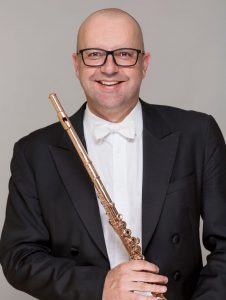Perth Concert Hall
reviewed by Neville Cohn
Aristotle had a poor opinion of the flute. “It does not have a good moral effect. It is too exciting”. But if, through some miracle of time travel, that ancient philosopher had come along to the Concert Hall, I’d like to think he would have been so impressed by the worth of Nielsen’s Flute Concerto and so charmed by the skill of both soloist and orchestra that he’d made a point of going backstage afterwards to shake the hands of both soloist and conductor – and ask for their autographs.
Nielsen’s Flute Concerto is not for faint-hearted flautists. It is ferociously difficult, treacherous at every turn – and it needs a master of the instrument to reveal its many subtleties. I cannot recall ever before encountering a more exciting account of Nielsen’s work than Andrew Nicholson’s performance at the weekend.
It was a tour de force by a flautist privy to the concerto’s every secret. And judging from the torrents of applause that broke out at the concerto’s conclusion (as well as, irritatingly, after the first movement), the capacity audience was of like mind.
Playing his superb, golden flute as if to the manner born, Nicholson reached for the heights with phrase after flawless phrase.
In turn elfin and insouciant with beautifully spun, sustained trills, flawlessly essayed arabesques and an enchanting aerial buoyancy, Nicholson was consistently impressive. He also had the advantage of a first class accompaniment as Asher Fisch took the players through a dauntingly tricky score.
Sibelius’ emotionally dark tone poem Tapiola will never head a list of orchestral favourites; it’s very seldom heard in contrast to, say, Finlandia or Pohjola’s Daughter. But it is most certainly worth an occasional airing. Its brooding quality was most meaningfully evoked with strings and brass in impressive form.
Two days before the 100th anniversary of Debussy’s death, we listened to the Master’s
Nocturnes. I particularly liked the skill with which Fetes was offered, coming across as some wild, exotic dance, music that inflames the imagination. Laurels to the brass section which excelled itself. Earlier, we listened to Nuages (Clouds) as Fisch and his forces very impressively evoked its mysterious, eerie atmosphere. It was a feast of sonic impressionism. In Sirenes, sopranos and altos of the WASO Chorus were positioned on what seemed an uncomfortably small on-stage area as we listened to its gentle, wordless singing, very slightly off-key.
It’s an odd fact that Ravel’s La Valse, that most danceable of works, was rejected by Diaghilev (while impresario for the famed Russian Ballet) because he felt it wasn’t danceable enough! Ravel was so deeply offended, he never spoke to Diaghilev again.
It was all stops out as Fisch took the WASO on a passionate journey through Ravel’s opus. It was a performance that set the pulse racing. Bravo!


